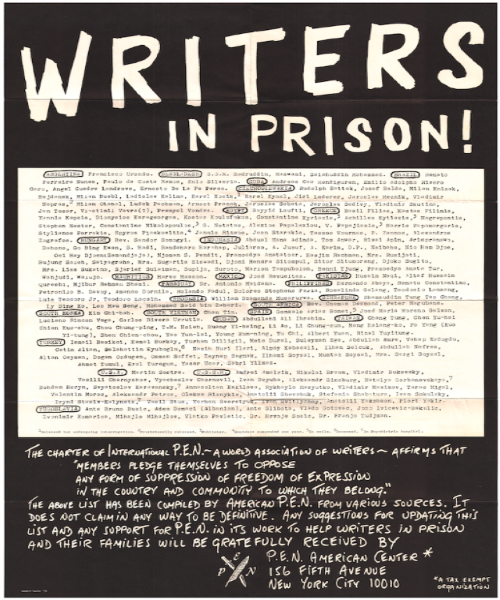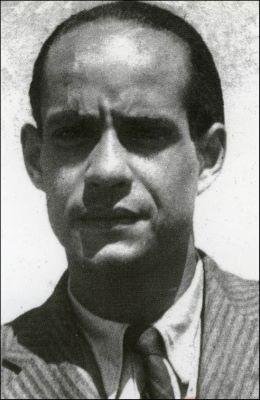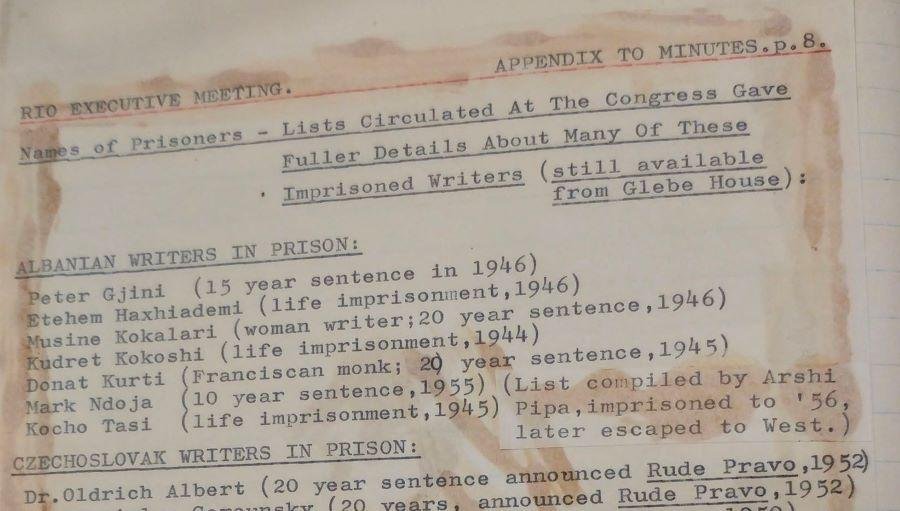From Jaques Roumain to Tsitsi Dangarembga: 100 years protecting Freedom of Expression
PEN American Centre's poster listing names of imprisoned writers.
PEN International’s public presence starts every year in The Hague with our Freedom of Expression Award. As 2021 is the celebration of the PEN Centenary, this year the award invites us to follow the process by which our organisation’s central mission has become the protection of Freedom of Expression.
Writer Catharine Amy Dawson Scott set up the PEN Club in London in 1921. From the very beginning, PEN was created as an international organisation of PEN Clubs in which writers from around the world could meet and discuss. The first president of PEN was John Galsworthy, and by 1930 there were PEN Clubs in 45 cities and in four continents.
The first months of 1933 accelerated PEN’s understanding of the need to protect freedom of expression. The death of John Galsworthy promoted HG Wells, a writer personally committed to free speech, to the presidency of PEN. This happened at the same time the Berlin PEN Club was occupied by writers at the service of the Nazis, and just few weeks before a PEN Congress took place in Dubrovnik. Socialist, communist and Jewish writers were detained or expelled from Germany, their books burned in public, and Berlin PEN did nothing to protect them. In Dubrovnik, HG Wells gave the floor to German-Jewish writer Ernst Töller who, with his famous speech denouncing the persecution of writers in Germany, created the climate for Berlin PEN Club to be expelled from the organisation. The following year a German PEN in Exile, with its office in London’s Oxford Street, attended the Edinburgh congress.
It was in 1935, at the Barcelona PEN congress, that for the first time PEN voted a resolution to campaign for an imprisoned writer. Haitian poet Jacques Roumain, founder of the Haitian communist party who was detained several times for his opposition to the US occupation of Haiti, was defended by the American delegate Henry Scidel Canby. According to the minutes, Dr. Canby «called the attention to the case of imprisonment of the Haitian author, Jacques Roumain» and «moved that the Government of Haiti be asked to re-consider the case».
Jacques Roumain
Under the pression of authoritarian regimes, freedom of expression was becoming central to PEN’s identity. On the first weeks of the Spanish Civil War in summer 1936, the poet Federico Garcia Lorca was executed in Granada by a fascist squad hours after a telegram was sent from London to the military authorities: «H.G. Wells, PEN President, awaits with anxiety to hear from his distinguished friend Federico Garcia Lorca and would enormously appreciate getting a response». The year after, PEN orchestrated its first successful campaign for the release of writer Arthur Koestler. Imprisoned and sentenced to death in Fascist Spain, Arthur Koestler was liberated after a cable was sent to General Franco bearing the names of all PEN council members as well as those of E.M. Foster and Aldous Huxley.
In the years after World War II, which saw up to eight European PEN Centres taking refuge in London, PEN shared the fate of so many writers in exile who were unable to return to their countries in Eastern Europe or Spain. There was even a PEN in Exile Centre created in 1951, and Hungarian-Jewish writer and journalist Paul Tabori became its president.
At the 1960 PEN Congress in Rio de Janeiro, the first list of cases was created with information gathered by writers who had escaped to exile. A body was created to articulate campaigns in their support: the committee of three, composed of Paul Tabori together with the president of English PEN Storm Jameson and the president of Dutch PEN Victor van Vriesland. The Writers in Prison Committee of PEN International had just been born in Rio.
PEN International's case list, 1960
From the list of cases compiled by exiled writers in 1960 to the team of researchers and campaigners at the London secretariat coordinating campaigns with PEN Centres participating in protecting our 2019 case list, year after year PEN has learned to research, support, campaign for writers in prison, protect writers at risk and shelter writers in exile. Later this year, PEN will be highlighting the lives of 60 writers, 60 PEN Cases, one for each year since the creation of the Writers in Prison Committee in 1960.
January 13th1971 saw the creation of the PEN Emergency Fund. The idea of setting up a special ‘writers-in-need fund’ emerged in the context of the Writers in Prison Committee. It began with the Dutch writer A. Den Doolaard who in 1971 set up the fund in the Netherlands. With efficiency and discretion, every year the fund has been supporting writers at risk, who are in need of immediate support to flee their country, find shelter, secure medical care or get a visa in the most difficult circumstances.
More recently: Ahmedur Rashid Chowdhury, the publisher of writers and secular bloggers in Bangladesh, was attacked by several men in his office in Dhaka in October 2015, barely surviving. He fled to Nepal while still under treatment and arrived in Skien City of Refuge in February 2016 —with the support of the PEN Emergency Fund. He received the Writer of Courage Award together with Margaret Atwood at the English PEN Pinter Award ceremony in 2016.
Another major step was PEN International’s partnership with Oxfam-Novib and the Writers Unlimited Festival in the Hague in 2005, when the Award for Freedom of Expression was created. Sihem Bensedrine, Anna Politkovskaya, Hrant Dink, Samar Yazbek, Gioconda Belli, Dareen Tatour and fifty other writers have been honoured in The Hague through the years.
On Wednesday 13th January 2021, PEN will honour the courage of Zimbabwean writer Tsitsi Dangarembga, who will receive the PEN Freedom of Expression Award in The Hague. In August 2020, African Centers campaigned for her freedom when she was arrested by members of the Zimbabwe Republic Police with neither warrant nor explanation, after she peacefully protested corruption in Harare. PEN cases have shaped the identity of PEN for a century. The organisation has grown and learned between the case of Tsitsi Dangarembga today and the cases of Jaques Roumain, García Lorca and Arthur Koestler in the 1930s.
On Wednesday, on the very moment Tsitsi Dangarembga will receive her award as part of the opening ceremony of the Writers Unlimited Festival in The Hague, we will also celebrate the 50th anniversary of the PEN Emergency Fund —and each of the steps PEN has made in its centenary history for the worldwide protection of the freedom to write.



